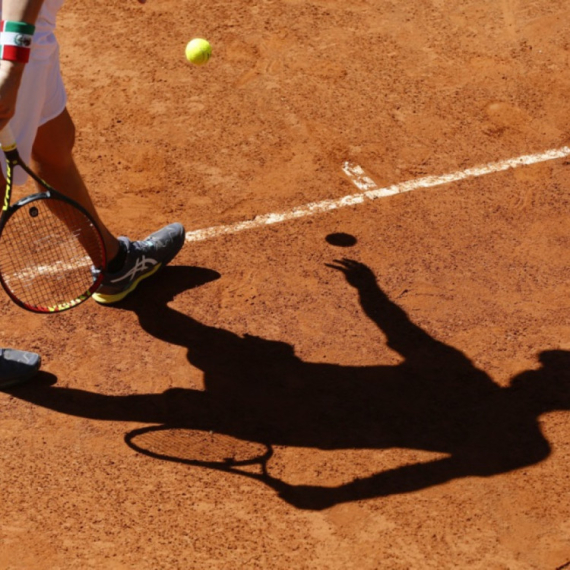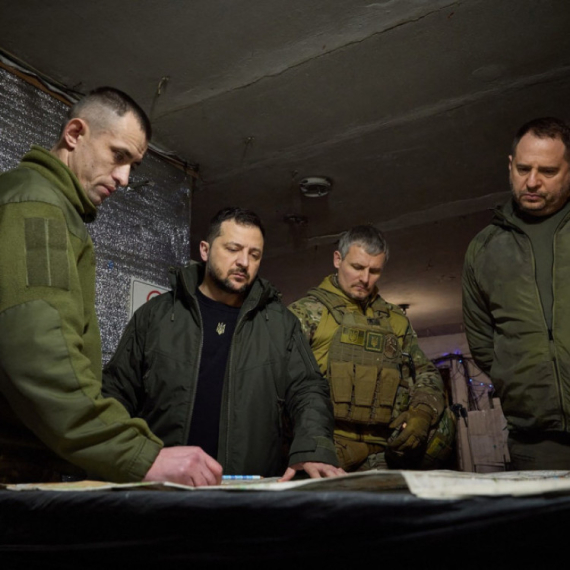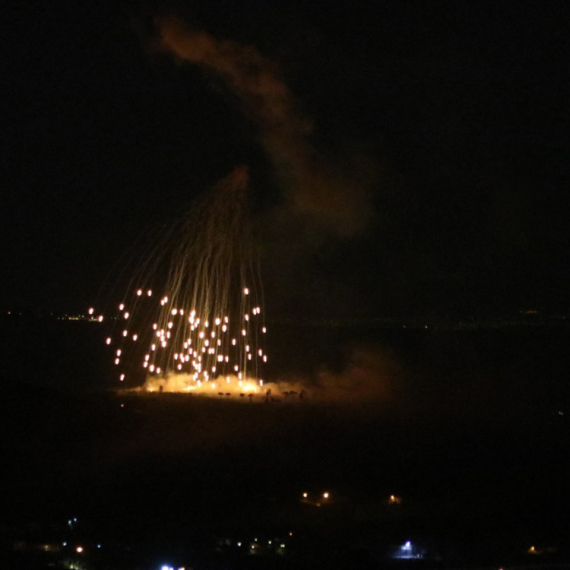Opposition DS leader finds himself "at edge of abyss"
It is important for Serbia to have a strong position, but analysts disagree on whether Boris Tadić should be the one to lead it, a B92 TV talk show concluded.
Monday, 15.10.2012.
09:46

BELGRADE It is important for Serbia to have a strong position, but analysts disagree on whether Boris Tadic should be the one to lead it, a B92 TV talk show concluded. Tadic, who in May lost his bid to be elected Serbia's president for a third term, and saw his Democrats (DS) lose power and joint the opposition, is currently fighting for his political survival within the party, where Belgrade Mayor Dragan Djilas is challenging his leadership. Opposition DS leader finds himself "at edge of abyss" Center for New Policy Director Vladimir Todoric was a guest on "Impression of the Week" late on Sunday, and said that Tadic was "at the edge of the abyss for the first time in his political career". However, said this analyst, "nobody can become a great politician" without finding themselves first in that position. The policy symbolized by Tadic was rife with mistakes "that everyone is emphasizing now", continued Todoric, while Tadic "also made a lot of positive steps": "Boris Tadic did some steps toward the reconciliation in the region. I believe that many people cannot butter their bread with (his) trips to Srebrenica and Vukovar." Todoric also noted that the country's president, Tomislav Nikolic, in the past "also lost elections", noting that "many are reproaching Tadic for losing elections". Regardless of whether the DS reelects Tadic as leader in November, or gives a chance to Djilas, the party "will be in trouble", he believes: "They must learn to be in opposition. Unfortunately, they don't know how, because they were in power for the past eight years". Bosko Jaksic, foreign affairs editor at the Belgrade-based daily Politika, also took part in the show to say that it was "a paradox" that a party that was working to bringing down Slobodan Milosevic, and in doing so "convincing us that nobody was irreplaceable", now succumbed "to the same symptoms and is in the same situation". This journalist believes that Tadic should have accepted his defeat in time, admitted to his mistakes, "especially bad personnel decisions", and that he should have "given up on a marketing-based policy, and returned to Social-Democracy". Jaksic also thinks a change within the DS is very important: "It's important for Serbia that the DS exists, but not with the old Boris Tadic. It will have to be some other Boris." Faculty of Political Sciences professor Vladimir Pavicevic also believes that the DS "needs changes, also at the helm": "If he (Tadic) is capable of realizing his own mistakes, to say, 'I made mistakes, I hesitated'... Still, he said that when he meant to dissolve the city board, when he was being sabotaged by the city board, and then he gave up and gave in to his enemies. The question is: if he can't sort out his own party, how would he behave if he was in power tomorrow." This professor identified "four of Tadic's major mistakes", and said the first was his exhibiting of an "authoritarian streak that was then transferred to an echelon of people in the DS, including his competitor". Next, while serving as president, Tadic "showed a lack of a sense of democracy": "He would explain that it was good to break the rules if it was good for the country." Tadic made decisions on appointments "when he could", and also "controlled former PM Mirko Cvetkovic, former Justice Minister Snezana Malovic, former FM Vuk Jeremic and former State Secretary Slobodan Homen, and in a bad manner at that", this professor further charged. Tadic's most serious mistake, Pavicevic said, was his proclivity for "deceiving the citizens", and said an example of this was his policy of the country both joining the EU and preserving Kosovo, because, said he, this was "pure deceit, a false compromise and impossible to achieve". Pavicevic concluded that Tadic's victory in the DS party elections would make the Democrats "weaker for a prolonged period of time". Vladimir Todoric (Medija Centar, file) B92
Opposition DS leader finds himself "at edge of abyss"
Center for New Policy Director Vladimir Todorić was a guest on "Impression of the Week" late on Sunday, and said that Tadić was "at the edge of the abyss for the first time in his political career". However, said this analyst, "nobody can become a great politician" without finding themselves first in that position.The policy symbolized by Tadić was rife with mistakes "that everyone is emphasizing now", continued Todorić, while Tadić "also made a lot of positive steps":
"Boris Tadić did some steps toward the reconciliation in the region. I believe that many people cannot butter their bread with (his) trips to Srebrenica and Vukovar."
Todorić also noted that the country's president, Tomislav Nikolić, in the past "also lost elections", noting that "many are reproaching Tadić for losing elections".
Regardless of whether the DS reelects Tadić as leader in November, or gives a chance to Đilas, the party "will be in trouble", he believes:
"They must learn to be in opposition. Unfortunately, they don't know how, because they were in power for the past eight years".
Boško Jakšić, foreign affairs editor at the Belgrade-based daily Politika, also took part in the show to say that it was "a paradox" that a party that was working to bringing down Slobodan Milošević, and in doing so "convincing us that nobody was irreplaceable", now succumbed "to the same symptoms and is in the same situation".
This journalist believes that Tadić should have accepted his defeat in time, admitted to his mistakes, "especially bad personnel decisions", and that he should have "given up on a marketing-based policy, and returned to Social-Democracy".
Jakšić also thinks a change within the DS is very important:
"It's important for Serbia that the DS exists, but not with the old Boris Tadić. It will have to be some other Boris."
Faculty of Political Sciences professor Vladimir Pavićević also believes that the DS "needs changes, also at the helm":
"If he (Tadić) is capable of realizing his own mistakes, to say, 'I made mistakes, I hesitated'... Still, he said that when he meant to dissolve the city board, when he was being sabotaged by the city board, and then he gave up and gave in to his enemies. The question is: if he can't sort out his own party, how would he behave if he was in power tomorrow."
This professor identified "four of Tadić's major mistakes", and said the first was his exhibiting of an "authoritarian streak that was then transferred to an echelon of people in the DS, including his competitor". Next, while serving as president, Tadić "showed a lack of a sense of democracy":
"He would explain that it was good to break the rules if it was good for the country."
Tadić made decisions on appointments "when he could", and also "controlled former PM Mirko Cvetković, former Justice Minister Snežana Malović, former FM Vuk Jeremić and former State Secretary Slobodan Homen, and in a bad manner at that", this professor further charged.
Tadić's most serious mistake, Pavićević said, was his proclivity for "deceiving the citizens", and said an example of this was his policy of the country both joining the EU and preserving Kosovo, because, said he, this was "pure deceit, a false compromise and impossible to achieve".
Pavićević concluded that Tadić's victory in the DS party elections would make the Democrats "weaker for a prolonged period of time".












































Komentari 0